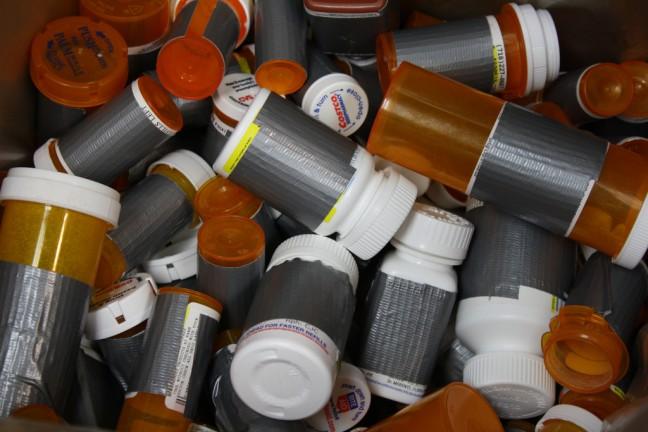The Madison Police Department, in partnership with other local institutions, received a Comprehensive Opioid Abuse Site-Based Program grant from the U.S. Department of Justice to create a “Pathways to Recovery Madison & Dane County” initiative.
In conjunction with MPD, the $1,200,000 COAP grant was awarded to Public Health Madison Dane County, Dane County Department of Human Services, Madison Fire Department and the University of Wisconsin Population Health Institute to reduce opioid abuse and fatalities.
Since 2017, MPD has had its own initiative, the Madison Addiction Recovery Initiative, or MARI. The program refers those who overdose or commit victimless offenses to “behavior drug treatment” as an alternative to jail.
According to the MARI webpage, MARI treatment is medication-assisted — regardless of personal insurance — and participants are additionally offered professional help for addiction. Furthermore, if a person sticks with the MARI program for six months, no charges will be filed for the incident.
Six months later, Madison Addiction Recovery Initiative proves success among five graduates
In the first 12 months of the program, 13 participants completed six months in the program, while 20 more were actively pursuing completion, the MARI webpage states.
Bernie Albright, the current MARI coordinator, said MPD cannot arrest or jail its way out of opioid abuse.
“What we want to do is divert opioid-addicted people from the criminal justice system and towards treatment,” Albright said. “People now understand that we’re here to help them with their addiction, not to prosecute them.”
The grant states it will provide for the employment of three officers — an MPD addiction resource officer, an MFD community paramedic and a certified peer specialist — to create a new Addiction Resource Team. The team will facilitate the distribution of naloxone, a medication designed to rapidly reverse opioid overdose, among other outreach efforts.
Law enforcement agencies will also be able to request active outreach and prevention visits by the Addiction Resource Team for people within their community known to be struggling with a substance use disorder, according to the grant.
The grant states it will also create Safe Stations at fire departments and other service facilities, which will provide addicted individuals with a safe space to seek help.
As prescriptions decrease, opioid overdoses continue to increase
In Dane County, the Pathways to Recovery initiative hopes to reduce opioid fatalities by 25%, as well as reduce opioid-involved EMS calls and hospital encounters by 25%.
The grant states that in 2018, Dane County experienced 85 opioid-involved deaths, 478 opioid-related hospital visits and 501 ambulance runs for suspected opioid overdoses.
Prescription painkillers, while approved for medical purposes, has resulted in overdoses, with Wisconsin notably having overdose rates 2.3% higher than the national average, according to the National Institute on Drug Abuse. According to Healthy Wisconsin, more than 80% of Wisconsin counties have seen opioid-related deaths.
“It’s one of the leading killers in Wisconsin now,” Albright said.
Jessica Seidel, a Certified Addiction Nurse, helps patients in a hospital’s dual-diagnosis outpatient clinic. Seidel monitors patients for withdrawal symptoms and connects them to resources and treatment.
Seidel said there are still efforts that need to be made to help those struggling with addiction.
“There is continuous work to be done in order to help individuals that struggle with opioid disorders,” Seidel said. “Our organization works hard to connect patients that want help or are willing to engage in treatment.”
UW System schools receive expanded access to opioid overdose reversal drug
When assessing the problem, researchers found that more opioid prescriptions are made in rural areas of the United States, according to The Cap Times. The article suggests that this is, in part, due to populations in rural communities being older, and those residents are more likely to suffer from age-related conditions like chronic pain and arthritis. Rural areas also have more physical labor jobs than their urban counterparts, leading to more injuries in the work environment.
Albright agreed, but noted recreational drug use is still a factor.
“There are people that start through recreational drug use, but what you see with opioid addiction is many people became addicted due to pain or an injury,” Albright said.
According to Healthy Wisconsin, more than 200,000 people as young as 12 are using opioids illegally – a number that “rivals the population of our capital city, Madison, Wisconsin.” Healthy Wisconsin also states that the potential for suicide is six times higher for those addicted to opioids.
Albright said he has some hope, though.
“The good news is it seems like the community as a whole has recognized the seriousness of this problem,” Albright said.
Correction: A previous version of this article stated Madison City Council provided the funds. It has since been corrected that the U.S. Department of Justice provided the funds. The Badger Herald regrets this error.
















